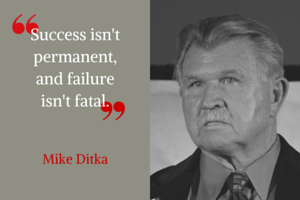Mike Ditka: How to Find Success Even When Dealing With Difficult People
By ASLAN Training
January 16, 2016
4 min read
 The ASLAN Other-Centered® Leader
The ASLAN Other-Centered® Leader
Coaches Quiz Blog Series
Every winner has a coach, and every coach has a philosophy. The ASLAN Other-Centered® Leader Coaches Quiz matches your coaching style with some of the legendary coaches in sports. Here is a deeper look inside the philosophy of one of the best.
Mike Ditka coached the 1985 Chicago Bears to a Super Bowl victory and fame unlike any football players had ever known before. Only one other person ever played on, assistant-coached and head-coached a Super Bowl winning team.
In the midst of his historic 1985 Super Bowl run, though, a conflict was brewing. Ditka's defensive coordinator James "Buddy" Ryan had been on the coaching staff when Ditka was hired in 1981, and though the two worked together for the next five years, they never really got along. It is reported that Ryan wanted to be head coach and resented Ditka's' hiring.
Even so, Ditka found ways to coexist with Ryan, who ran an excellent defense during his time with the Bears. Despite their differences, team members loved and revered both coaches. Ditka gave Ryan quite a bit of autonomy to run the defense as Ryan saw fit, and the team was successful even in the midst of this serious conflict.
When the team won the Super Bowl in 1985, players carried both Ditka and Ryan off the field separately. It is a testament to the talent of both the team and the coaches that they were able to field a strong, cohesive team despite the conflict between them.
Similarly in the sales field, the ASLAN Training whitepaper "Why Call Center Reps Hate to Sell" describes how sales coaches can overcome fundamental conflicts with their staff to help them become effective at meeting their customers' true needs.
THE WARNING SIGNS ARE EVERYWHERE
- The hushed tones when Call Center Reps gather in the break room
- The wide-eyed looks when selling promotions are announced
- The cries of, "If I wanted to be in sales, I would have interviewed for a sales job!"
- The sighs of resignation during sales training classes
- The new resumes on Monster.com that somehow seem vaguely familiar
When Call Center Reps hate to sell, we put our customer service AND sales programs at risk. Instead of driving revenue up we may be driving customers away.
Yet this is a problem worth solving. While the cost of telephone calls has dropped during recent years, the challenges of selling over the telephone have increased. Regulations limit when, how, and to whom we deliver our sales offers. Gaining access to new prospects over the telephone gets tougher and tougher, which makes selling more to current customers more appealing than ever. When customers call our support center for help, we have the very access we need to begin a sales conversation. All the Call Center Reps have to do is:
- Fix the problem that caused the customer to call
- Confirm that the customer is happy
- Sell them more stuff
VALUES DISCONNECT
As children, we developed notions about what different jobs were like: doctor, police officer, lion tamer. Even though we may never have had the opportunity to actually perform any of those jobs, we developed an opinion about them. Likewise, many of us developed preconceptions about the job of the salesperson. The image of the used car salesperson is not typically associated with honor, trust or service. In many cases, Call Center Reps have already made the decision that they do NOT want to go into sales because the things salespeople do violate their principles and values. When a Rep learns that their new job description at your Company now includes the word "sales," they often experience a figurative kick in the gut as they realize they have to violate their value system in order to keep their job.
To address the perceived value disconnect and relieve the Reps' emotional tension, it's critical to communicate that serving the customer at the highest level includes enabling the customer to purchase solutions for all their needs, not just the one that prompted them to call. This "Total Service" approach means that Call Center Reps will work with customers to help them resolve not only their stated needs, but their unstated needs as well.
The Reps need you to provide them with a customer-focused communications strategy that they can willingly buy into. They want to know that management at the highest levels is not advocating manipulation and pushing product, and that the goal is to better serve the customer on every call. Reps will need to lead the discussion with customers and help them discover how they can improve their situation through options they weren't aware of. Reps will need to learn how to dig deeper and learn more about each customer's unique situation. Our customers expect us to be the experts in our business and our industry, and we owe it to our customers to use our expertise to help them.
We don't know exactly how Ditka and Ryan managed to work together when they didn't like each other. Reports of arguing and conflicts abound, but together they managed to produce what is generally regarded as one of the greatest football teams that ever existed. Overcoming conflict is going to be part of any sales coach's job, and learning how to do so will benefit both the coach and the sales team.
Unlock Your Team's Full Sales Potential
Questions? Watch our CEO, Tom Stanfill, address our frequently asked questions below.

